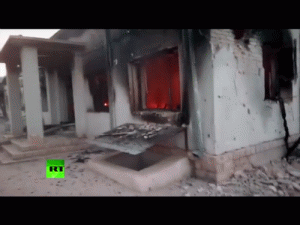Reprinted on Consortium News

Aftermath of the U.S. destruction of the Doctors Without Borders hospital in Kunduz, Afghanistan.
(Image by (Graphic credit: RT)) Details DMCA
In one of the most despicable incidents of the United States' 14-year war in Afghanistan, U.S. troops bombed a hospital in Kunduz, killing 22 people, including patients, three children, and medical personnel from Doctors Without Borders, or MSF. Thirty-seven people were injured, including 19 staff members in the Oct. 3 attack.
U.S. forces knew they were targeting a hospital because MSF, as it does in all conflict contexts, had provided its exact GPS coordinates on multiple occasions over the past months, including most recently on Sept. 29. There was a nine-foot flag on the roof that identified the building as a hospital. After the first strike, MSF contacted U.S. officials and reported the hospital was being bombed and begged them to halt the attack. Nevertheless, the U.S. AC-130 gunship continued to pummel the hospital repeatedly for more than one hour.
In attempting to explain why they had bombed a hospital, U.S. military leaders changed their story four times. On Saturday, the day of the bombing, U.S. spokesman Col. Brian Tribus said the strike occurred "against individuals threatening the force. The strike may have resulted in collateral damage to a nearby medical facility."
On Sunday, Gen. John Campbell, U.S.-NATO commander in Afghanistan, claimed the strike occurred "against insurgents who were directly firing upon U.S. service members ... in the vicinity of a Doctors Without Borders medical facility."
On Monday, Campbell announced, "Afghan forces advised that they were taking fire from enemy positions and asked for air support" and "several civilians were accidentally struck." By Tuesday, Campbell said, "the decision to provide aerial fire was a U.S. decision, made within the U.S. chain of command. A hospital was mistakenly struck. We would never intentionally target a medical facility."
Since the Pentagon has access to video and audio recordings taken from the gunship, they must know what actually occurred. Daily Beast reported that the recordings contain conversations among the crew as they were firing on the hospital, including communications between the crew and U.S. soldiers on the ground. Moreover, AC-130 gunships fly low to the ground so the crew can assess what they are hitting.
But members of Congress who oversee the Pentagon have been denied access to the classified recordings.
Article 18 of the Fourth Geneva Convention states, "Civilian hospitals organized to give care to the wounded and sick, the infirm and maternity cases, may in no circumstances be the object of attack, but shall at all times be respected and protected by the parties to the conflict."
International law expert Mary Ellen O'Connell, a professor at Notre Dame Law School, said, "The critical question for determining if U.S. forces committed a war crime was whether they had notified the hospital ahead of the strike if they understood the Taliban to be firing from the hospital."
MSF has said they were never notified that the hospital would be bombed. "Not a single member of our staff reported any fighting inside the MSF hospital compound prior to the U.S. airstrike on Saturday morning," according to MSF General Director Christopher Stokes.
Parties to a military conflict have a duty to distinguish between civilians and combatants, and civilians and their facilities cannot be targeted. If the hospital were being used for military purposes, the strike must be proportionate to the military advantage sought, and the U.S. forces had a duty to warn the people inside the hospital that it would be struck. No one in the hospital said it was being used for military purposes, and even if it was, the U.S. forces never warned those in the hospital before striking it.
The U.S. strike was a precise attack on the hospital, because no other buildings in the MSF compound were hit. MSF executive director Jason Cone said, "I want to reiterate that the main hospital building where medical personnel were caring for patients was repeatedly and very precisely hit during each aerial raid while the rest of the compound was left mostly untouched. So we see this as a targeted event."
MSF is demanding an independent investigation by the International Humanitarian Fact-Finding Commission (IHFFC), established under Additional Protocol I to the Geneva Conventions. But the United States must consent to the investigation. The U.S. government says there are enough investigations -- one by the Pentagon, one by a joint U.S.-Afghan group, and one by NATO. But none of these is independent and impartial.
Historian and investigative journalist Gareth Porter has written three articles about three different internal investigations the U.S. military used to cover-up operations that should have led to criminal prosecutions against U.S. officers. Why should we believe that this will be any different?
(Note: You can view every article as one long page if you sign up as an Advocate Member, or higher).





